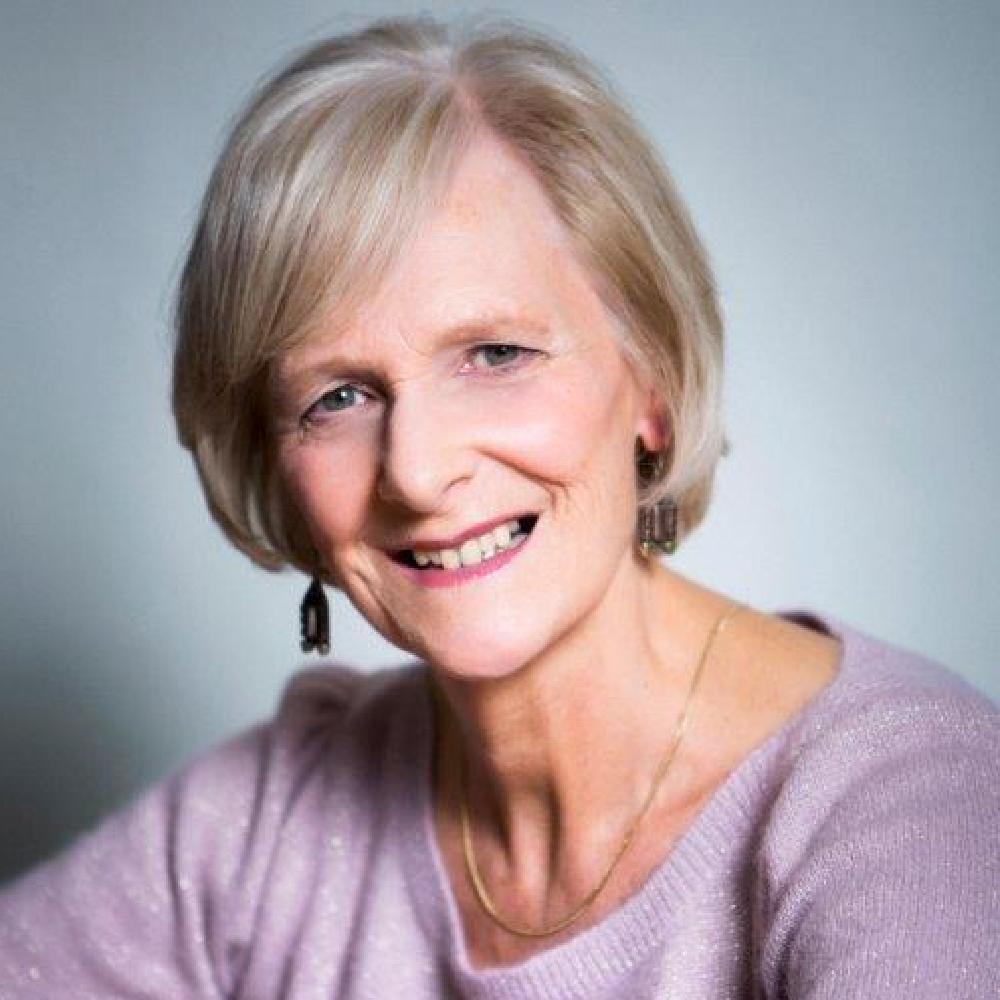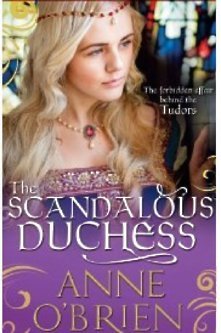
Anne O'Brien

The Scandalous Duchess is the story of perhaps the most famous lovers in medieval history: Katherine Swynford and John of Gaunt, Duke of Lancaster, bound up in an adulterous love affair for almost thirty years. Never a light hearted, sugar-coated romance (honey-coated in 14th century), pursued under the eye of the Duke’s second wife Constanza of Castile, it was a born out of a far stronger emotion, a passion that kept them together through scandal and public ignominy. Katherine was denounced as a witch and evil enchantress. Marriage should have restored her to respectability but it was frowned on. Royal princes did not marry their mistresses.
This is what spurred me on to write this novel. How could a respectable, pious widow, as Katherine undoubtedly was, engage in an affair that would put her immortal soul in danger? How could she flaunt herself in the public eye and bear the burden of court outrage? Could love outweigh such pain? Read on in The Scandalous Duchess ...
Is historical and romantic fiction something that you plan to stay with or do you ever want to venture into another genre?
I have no plans to abandon historical fiction. It is a genre in which I feel comfortably at home. The romance of my novels depends on the characters, since some of them are definitely far more romantic that others. Characters in medieval history fascinate me. Where is it possible to find more enthralling stories? The relationships between medieval characters are dynamic, full of heartbreak and intense joy, driving ambition and the despair of absolute failure, love requited and rejected (much like today, really). It is powerful, heady stuff to write, and, I hope, to read.
After saying that, I might at some point in the future switch historical periods. The colourful vitality of the nineteenth century Pre-Raphaelite painters fascinates me. They led such flamboyant talented lives with their wives and mistresses. I am certain there is in novel waiting for me world of Dante Gabriel Rossetti and his associates.
You were encouraged by the success from short story competitions, so can you tell us about some of the stories you wrote?
None of my early short stories were historical, a fact that astonishes me now. They were based very strongly on contemporary relationships and events, but not, I must say, from personal experience. So here is a taste of them:
- the meaning of flowers; a tale of a romantic market gardener and a love-lorn but stubborn lady.
- the anxieties of a woman facing retirement, spending every day with a husband who no longer offers her romance or companionship. All this as well as coping with an unwanted retirement present ...
- a dire warning about the dangers of going on mystery tours.
So all about relationships but with quite a dose of comedy, which I don't often find in historical fiction.
Why is it important for women of today to read stories that give a voice to the women in history?
The women of medieval England seem so distant and so different from us with their cumbersome clothing and the social and moral restrictions on their behaviour. I think there is less difference than we think. They experienced the same emotions, the same need for family, happiness and fulfilment, and for some the same ambition to play a role in the society of their day. Also, without doubt, we discover the same exasperation with their husbands or lovers.
It is sometimes a good thing for us to remember how far women have travelled in their search for independence, even if we are still rarely satisfied. Most medieval women lived under the unyielding authority of father, husband or wider family. Being unwed could be even worse than a political marriage. A nunnery was the ultimate destination for some.
Medieval women have so much to say. I am certain that they were not mindless ciphers, even if history dominated by men suggests that they were. Many women played a strong role in family, land management, household organisation and even in political events. Some were quite manipulative in achieving their own ends! It makes for great reading.
How much inspiration do you get from trekking?
I had never thought about this until faced with this question, yet there are some strong similarities. In both there are good days and bad days. There are days when every little gain, every step, takes great effort and the result does not bring satisfaction (fortunately not many.) On other days (most of them!) it is so easy to reach the mountain top and take in the view of your achievements. Both writing and trekking require persistence, tenacity and determination when under pressure. A trekker must get to the end of the day's trek. A writer must complete the day's assignment. No excuses in either!
And both, of course, are a source of absolute delight when all goes according to plan and you can feel smug about it ...
While you wrote Regency romances at what point did you decide to move on to women in history?
It all began when I wrote romances based on the lives of women who lived in the Welsh Marches where I live. This involved a Civil War siege, the lawless bandit territory of the early Norman period and the devastation of the Wars of the Roses that tore families apart.
And then ambition struck. I felt a compulsion to write about these women, and others in English history, and I wanted greater scope to explore a wider span of emotion and influences on the lives of my heroines. When writing a romance it is necessary to tinker with the truth; how can I allow the heroine to die at the end of the novel? But to write an historical novel, it is quite acceptable to deal with death and destruction and move the reader to tears.
I have been hooked ever since.
How much did writing your short stories help you to craft your writing?
Writing a short story demands enormous will power. It may be 'short' but it must have all the necessary ingredients: a definite start/middle/end, a crisp plot to keep the reader involved in the experience of the hero/heroine, both of whom must have a strong emotional appeal. No time or space for self-indulgence from the writer! All has to be explained, developed and fulfilled in so few words.
The same construction is necessary for a novel, simply on a large scale, but here the will-power has to be even stronger. The greatest danger is to be seduced by the extra space, allowing it to be filled with descriptions or 'moments of interest to the writer' - neither of which carry the plot forward.
What is next for you?
I am writing about Elizabeth of Lancaster, younger daughter of John of Gaunt and the beautiful Blanche of Lancaster. I first came across her when visiting her splendid tomb in the tiny rural church at Burford in Shropshire, and then again when writing The Scandalous Duchess. History has not always been kind to Elizabeth, either ignoring her in favour of her more famous siblings Henry IV and Philippa who became Queen of Portugal, or describing her as a woman no better than she should be - 'frankly wanton and highly-sexed.’
There is so much more to Elizabeth than her marital adventures - she was married three times - being part of the powerful and ambitious Plantagenet family. Governed by duty but seduced by a man of great charm if dubious character, she was torn apart by family loyalties and betrayal in the overthrow of Richard II. A lively young woman, gifted and precocious, she was forced to choose between husband and brother, thus experiencing both the joys and pain of the political battles of the late 14th century. Elizabeth provides us with a splendid heroine, and John Holand, Duke of Exeter, is a troubled but compulsive hero.
What better characters for an historical novel. Elizabeth and John are keeping me very busy at the moment.

